
Unlock the power of genetic testing with Ask PlexusDx, the podcast that turns complex DNA insights into actionable wellness advice. Each short, science-backed episode breaks down genetic methylation, nutrient metabolism, sleep, fitness, longevity, and more—helping you make smarter lifestyle, nutrition, and supplement choices. Whether you’re exploring genetic wellness or embracing precision medicine, we’ll help you decode your DNA for a healthier, longer life. Subscribe now and start your journey to personalized wellness—powered by your genes! Visit PlexusDx.com to learn more.
Episodes

Thursday May 15, 2025
How do genetic tests assess my hypoglycemia risk?
Thursday May 15, 2025
Thursday May 15, 2025
Understanding Hypoglycemia Through Genetic Testing
This episode is proudly sponsored by PlexusDx - your trusted partner in precision health. Discover the power of personalized wellness with our Glucose, Insulin, and GLP-1 Genetic Test and over 25 cutting-edge health and wellness genetic tests designed to help you optimize your health. Visit PlexusDx.com to learn more. Now, let’s dive into today’s episode!
Welcome to our exploration of how genetic tests can reveal your chances of developing hypoglycemia. It’s fascinating to consider how our genetic makeup influences our health, particularly regarding blood sugar levels.
Hypoglycemia, or low blood sugar, can lead to symptoms such as dizziness, confusion, and in severe cases, serious health issues. While diet and exercise are often seen as the main factors in blood sugar regulation, our genetics also play a significant role. Certain genetic mutations can affect how our bodies process insulin and glucose, which is where genetic testing becomes essential.
One key player in this genetic landscape is the MTHFR gene. Variations in this gene can impact how your body processes folate and homocysteine, both crucial for maintaining stable blood sugar levels. If you have specific variations, you might experience more fluctuations in your blood sugar, increasing your risk for hypoglycemia.
You may wonder how genetic testing can actually help you. It provides personalized insights into your unique genetic structure, allowing you to understand how your body metabolizes sugars and reacts to insulin. With this knowledge, you can take proactive steps to manage your health, such as adjusting your diet or exercise routine.
After receiving your genetic test results, it’s important to take practical steps. First, consult with a healthcare provider who specializes in genetics. They can help you interpret your results and create a tailored health strategy. Additionally, monitor your blood sugar levels, especially if you have a family history of diabetes or metabolic disorders. Regular monitoring can help you identify trends and make necessary adjustments.
Speaking of adjustments, let’s discuss diet. Focus on a balanced plan that includes whole foods—think complex carbohydrates like whole grains, lean proteins like chicken or tofu, and healthy fats like avocados and nuts. Don’t forget to stay active! Aim for at least 150 minutes of moderate exercise each week, as it helps your body use insulin more effectively.
Finally, educate yourself about hypoglycemia and its management. The more you know, the better decisions you can make for your health.
In conclusion, genetic testing can provide valuable insights into your risk for hypoglycemia, helping you understand the genetic factors that affect your blood sugar regulation. With PlexusDx's Precision Health & Wellness testing, you can uncover your genetic vulnerabilities and take proactive steps to manage your health.
If you’re interested in exploring these innovative tests, check out PlexusDx at PlexusDx.com, Amazon, or Walmart.com. Links to the tests are provided below. And if you found this information insightful, please like and subscribe!
Disclaimer: PlexusDx is a personalized health report and laboratory testing service that enables users to obtain science-based, evidence-backed health and wellness information based on their genome. Always consult a licensed healthcare provider for concerns about your health and before you stop or start any medical treatment.
Where to Buy PlexusDx Genetic Tests
Ready to take control of your health with precision genetic insights? You can purchase the PlexusDx Glucose, Insulin and GLP-1 Genetic Test from these trusted retailers:
- 👉 PlexusDx – Order directly from our official website.
- 👉 Amazon – Convenient shopping with fast shipping.
- 👉 Walmart – Buy online from a trusted retailer.
Get your personalized DNA insights today and start optimizing your health! 🚀

Wednesday May 14, 2025
How can genetic testing aid in diabetes prevention?
Wednesday May 14, 2025
Wednesday May 14, 2025
Can Your Genetic Code Reveal Ways to Prevent Diabetes?
This episode is proudly sponsored by PlexusDx - your trusted partner in precision health. Discover the power of personalized wellness with our Glucose, Insulin, and GLP-1 Genetic Test and over 25 cutting-edge health and wellness genetic tests designed to help you optimize your health. Visit PlexusDx.com to learn more. Now, let’s dive into today’s episode!
Welcome to our educational podcast episode where we explore an important question: Can your genetic code reveal ways to prevent diabetes? Our genetics play a significant role in our health, particularly concerning conditions like diabetes. It’s not just about diet and exercise; your genetic makeup can influence your risk of developing diabetes.
Studies have shown that certain genetic markers can heighten this risk, especially those related to insulin production and glucose metabolism. Many people are unaware that they might carry genetic variants that could make them more susceptible to diabetes. For instance, the MTHFR gene affects how your body processes folate and regulates homocysteine levels. Higher homocysteine levels have been linked to insulin resistance and type 2 diabetes. Understanding your genetic profile can empower you to make lifestyle choices that help mitigate these risks.
Once you receive your genetic test results, it’s crucial to analyze them and integrate that information into your daily life. Here are a few strategies you might consider:
Personalized Nutrition: Your genetic predisposition can guide you in selecting foods that meet your specific nutritional needs. If your results indicate a higher risk for insulin resistance, you might benefit from a low-carb diet rich in whole foods.
Targeted Exercise Plans: Your body’s response to different types of exercise can vary based on your genetics. With genetic testing, you can tailor your fitness routine to maximize your diabetes prevention efforts.
Early Intervention: If your genetic test suggests an increased risk for diabetes, healthcare providers can help you establish preventive measures, such as regular blood sugar monitoring and lifestyle changes.
So, what’s next after receiving your results? Here are some practical tips to make the most of your genetic insights:
- Consult with a healthcare provider. They can help you interpret your results and create a personalized prevention strategy.
- Adopt a balanced diet. Focus on whole foods—fruits, vegetables, lean proteins, and healthy fats—while cutting down on processed foods and sugars.
- Stay active! Aim for at least 150 minutes of moderate exercise each week, combining aerobic workouts with strength training.
- Monitor your health regularly. Keeping an eye on your blood sugar levels is essential, especially if you have a genetic predisposition to diabetes.
- Educate yourself about diabetes and its risk factors. The more you know, the better choices you can make for your health.
In conclusion, a genetic test can be a game-changer in your journey to prevent diabetes. By understanding your genetic predisposition, you can make informed decisions about your diet, exercise, and overall health management.
If you’re interested in exploring your genetic composition, check out the Precision Health & Wellness tests from PlexusDx. You can find them at PlexusDx.com, Amazon, and Walmart.com. These tests offer valuable insights to help you manage your health and lower your diabetes risk.
Thank you for reading! If you found this information insightful, please like and subscribe to our podcast. Remember, links to PlexusDx tests are provided below.
Disclaimer: PlexusDx is a personalized health report and laboratory testing service, which enables users to obtain science-based, evidence-backed health and wellness information based on their genome. Always consult a licensed healthcare provider for concerns about your health and before you stop or start any medical treatment.
Where to Buy PlexusDx Genetic Tests
Ready to take control of your health with precision genetic insights? You can purchase the PlexusDx Glucose, Insulin and GLP-1 Genetic Test from these trusted retailers:
- 👉 PlexusDx – Order directly from our official website.
- 👉 Amazon – Convenient shopping with fast shipping.
- 👉 Walmart – Buy online from a trusted retailer.
Get your personalized DNA insights today and start optimizing your health! 🚀
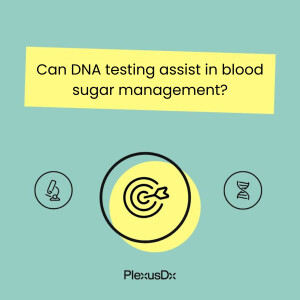
Monday May 12, 2025
Can DNA testing assist in blood sugar management?
Monday May 12, 2025
Monday May 12, 2025
Understanding Blood Sugar Management Through Genetic Testing
This episode is proudly sponsored by PlexusDx - your trusted partner in precision health. Discover the power of personalized wellness with our Glucose, Insulin, and GLP-1 Genetic Test and over 25 cutting-edge health and wellness genetic tests designed to help you optimize your health. Visit PlexusDx.com to learn more. Now, let’s dive into today’s episode!
Welcome to our podcast! Today, we’re exploring an intriguing question: Can analyzing my DNA through testing help me gain better control over my blood sugar?
The short answer is yes! Genetic testing can provide valuable insights into how your body manages blood sugar. Our DNA serves as a blueprint for our bodies, influencing everything from our physical traits to how we metabolize sugars.
Genetic variations can affect how we respond to insulin, which is crucial for blood sugar regulation. Some individuals may have genetic predispositions that make them more susceptible to spikes in blood sugar when consuming certain foods. Understanding these genetic factors can empower you to make smarter dietary and lifestyle choices.
So, how does a DNA test actually help with blood sugar management? It can reveal important information about your insulin sensitivity, carbohydrate metabolism, and even your risk of developing type 2 diabetes. For instance, if your genetic profile shows reduced insulin sensitivity, you might want to keep a closer eye on your carbohydrate intake.
Here are some actionable steps you can take:
First, consider getting tested. A DNA test focused on metabolic health can provide insights into how your body processes sugars. PlexusDx offers specialized tests that analyze these factors, giving you a clearer picture of your genetic makeup.
Next, it’s essential to consult with a healthcare provider after you receive your results. They can help interpret what those results mean for you and guide you in creating a personalized health plan. Remember, while DNA tests are incredibly informative, they should complement traditional medical advice.
Once you have your insights, you can start adjusting your diet. If your results indicate carbohydrate sensitivity, opting for low-glycemic foods can help minimize blood sugar spikes. Think whole grains, veggies, and lean proteins—your body will thank you!
Don’t forget to monitor your blood sugar regularly. Keeping track of how different foods and activities affect your levels can be a game-changer. Staying active is key! Aim for at least 150 minutes of moderate exercise each week. Activities like walking, cycling, or swimming can significantly improve your insulin sensitivity.
In conclusion, a DNA test can be a powerful tool for managing blood sugar. By understanding your genetic tendencies, you can make informed choices about your nutrition and lifestyle. Always consult with a healthcare provider to interpret your results and develop a tailored health plan.
If you’re interested in exploring PlexusDx’s innovative precision health and wellness genetic tests, you can find them at PlexusDx.com, Amazon, and Walmart.com. Links to these tests are provided below.
Thank you for reading! If you found this information insightful, please like and subscribe to our podcast. Your support means a lot.
Disclaimer: PlexusDx is a personalized health report and laboratory testing service, which enables users to obtain science-based, evidence-backed health and wellness information based on their genome. Always consult a licensed healthcare provider for concerns about your health and before you stop or start any medical treatment.
Where to Buy PlexusDx Genetic Tests
Ready to take control of your health with precision genetic insights? You can purchase the PlexusDx Glucose, Insulin and GLP-1 Genetic Test from these trusted retailers:
- 👉 PlexusDx – Order directly from our official website.
- 👉 Amazon – Convenient shopping with fast shipping.
- 👉 Walmart – Buy online from a trusted retailer.
Get your personalized DNA insights today and start optimizing your health! 🚀

Sunday May 11, 2025
Can genetic testing assess my risk for diabetes complications?
Sunday May 11, 2025
Sunday May 11, 2025
Understanding Genetic Testing for Diabetic Complications
This episode is proudly sponsored by PlexusDx - your trusted partner in precision health. Discover the power of personalized wellness with our Glucose, Insulin, and GLP-1 Genetic Test and over 25 cutting-edge health and wellness genetic tests designed to help you optimize your health. Visit PlexusDx.com to learn more. Now, let’s dive into today’s episode!
Welcome to our educational podcast episode where we explore the fascinating question: Can genetic testing determine your chances of developing diabetic complications?
The concept of using genetic tests to predict diabetic complications is incredibly empowering. By understanding your genetic information, you can uncover important clues about your risk factors related to diabetes. While genetic testing isn’t a crystal ball that can foresee your future, it does provide valuable insights into your genetic risks.
Research has shown that certain genetic markers can elevate the risk of complications such as neuropathy, retinopathy, and cardiovascular issues in individuals with diabetes. Being aware of these potential health risks allows you to take preventive measures to safeguard your well-being. It’s akin to having a roadmap for your health!
Genetics and diabetes specialists emphasize the significance of these tests. With a comprehensive understanding of your genetic profile, your healthcare provider can develop customized treatment strategies tailored specifically for you. For example, if your genetic testing indicates a higher risk for cardiovascular issues, your doctor might recommend regular heart health check-ups or lifestyle changes to help manage that risk. This personalized approach can lead to improved health outcomes and empower you to take an active role in managing your health.
So, how does genetic testing actually work? Typically, it involves collecting a saliva sample to examine specific genetic markers. These markers can reveal how your body metabolizes glucose and reacts to insulin, providing insights into your risk of developing complications. One popular test is the MTHFR genetic test, which looks at variations in the MTHFR gene that influence folate metabolism and cardiovascular health.
However, it’s important to remember that this is just one piece of a larger puzzle. By identifying genetic variants, you can collaborate with your healthcare provider to create a personalized health management plan. This may include adjustments to your diet, exercise routine, or even your medication regimen based on your unique genetic makeup.
If you’re considering genetic testing to understand your risk for diabetic complications, here are a few practical steps to take:
- First, consult with your healthcare provider. They can help you determine which tests are most relevant for your needs.
- Next, choose the right test based on your personal health history and family medical background.
- After you receive your results, review them thoroughly with your healthcare provider to understand what they mean for your health management.
- Finally, let those results motivate you to explore potential lifestyle changes—like adjusting your diet or increasing your physical activity.
As we conclude, it’s essential to recognize that genetic testing is an evolving field. Staying informed about new research can help you understand more about diabetes and its possible complications.
If you’re interested in exploring genetic testing options, we highly recommend checking out the innovative Precision Health & Wellness tests from PlexusDx. These saliva-based tests can provide you with deeper health insights, helping you make better-informed health decisions. You can find them at PlexusDx.com, Amazon, and Walmart.com.
And don’t forget, links to PlexusDx tests are provided below. If you found this information insightful, please like and subscribe!
Disclaimer: Always consult a licensed healthcare provider for concerns about your health and before you stop or start any medical treatment.
Thank you for reading! Until next time, take care of yourselves!
Where to Buy PlexusDx Genetic Tests
Ready to take control of your health with precision genetic insights? You can purchase the PlexusDx Glucose, Insulin and GLP-1 Genetic Test from these trusted retailers:
- 👉 PlexusDx – Order directly from our official website.
- 👉 Amazon – Convenient shopping with fast shipping.
- 👉 Walmart – Buy online from a trusted retailer.
Get your personalized DNA insights today and start optimizing your health! 🚀

Saturday May 10, 2025
What genes influence pancreatic function and insulin production?
Saturday May 10, 2025
Saturday May 10, 2025
Understanding the Genes Behind Pancreatic Activity and Insulin Synthesis
This episode is proudly sponsored by PlexusDx - your trusted partner in precision health. Discover the power of personalized wellness with our Glucose, Insulin, and GLP-1 Genetic Test and over 25 cutting-edge health and wellness genetic tests designed to help you optimize your health. Visit PlexusDx.com to learn more. Now, let’s dive into today’s episode!
Welcome to our exploration of a fascinating topic: the genes that control pancreatic activity and insulin synthesis. Understanding how our body manages blood sugar levels is crucial, and it all starts with some important genes.
The pancreas is an incredible organ that plays a dual role in digestion and blood sugar control. It produces digestive enzymes and hormones, like insulin, which is essential for regulating blood glucose levels. When everything works smoothly, your pancreas releases just the right amount of insulin when you eat. However, genetic differences can lead to issues like insulin resistance or even diabetes.
Let’s break down some key genes involved in this process:
- INS gene: This gene is responsible for producing insulin. Changes in the INS gene can affect how much insulin is secreted, directly impacting your blood sugar levels.
- GCK gene: This gene produces an enzyme crucial for regulating blood glucose. Mutations in the GCK gene can lead to defective insulin secretion, increasing the risk of diabetes.
- HNF1A gene: Vital for the function and formation of pancreatic beta cells that produce insulin, variants in HNF1A can lead to a specific type of diabetes known as maturity-onset diabetes of the young (MODY).
- PPARG gene: Involved in fat cell development and glucose processing, changes in this gene can affect insulin sensitivity, contributing to type 2 diabetes.
- TCF7L2 gene: This gene controls insulin secretion and glucose metabolism. Variants in TCF7L2 are among the highest genetic risk factors for developing type 2 diabetes.
Understanding these genes can empower you to take charge of your health. But how can genetic testing help?
By analyzing your genetic makeup, you can uncover important details about how your pancreas operates and how well it produces insulin. For instance, if you discover a variant in the GCK gene, you might want to enhance your blood sugar monitoring and adjust your diet accordingly.
This is where PlexusDx comes in. Our saliva-based genetic tests provide insights into your health, including how your genes influence pancreatic function and insulin production. You can find these tests at PlexusDx.com, Amazon, and Walmart.com. They cover a range of areas, from nutrition to overall health risk management, helping you make informed decisions about your wellness.
If you’re curious about your genetic predispositions and want to take proactive steps towards better health, we encourage you to check out PlexusDx. Remember, knowledge is power, and understanding your genetics can lead to a healthier you.
Thank you for reading! If you found this information helpful, please like and subscribe. You can find links to our tests on our website and other platforms.
And just a quick reminder: PlexusDx tests are available at PlexusDx.com, Amazon, and Walmart.com.
The following is an important disclaimer: PlexusDx is a personalized health report and laboratory testing service, which enables users to obtain science-based, evidence-backed health and wellness information based on their genome. Always consult a licensed healthcare provider for concerns about your health and before you stop or start any medical treatment.
Where to Buy PlexusDx Genetic Tests
Ready to take control of your health with precision genetic insights? You can purchase the PlexusDx Glucose, Insulin and GLP-1 Genetic Test from these trusted retailers:
- 👉 PlexusDx – Order directly from our official website.
- 👉 Amazon – Convenient shopping with fast shipping.
- 👉 Walmart – Buy online from a trusted retailer.
Get your personalized DNA insights today and start optimizing your health! 🚀

Friday May 09, 2025
What genetic factors influence metabolic syndrome risk?
Friday May 09, 2025
Friday May 09, 2025
Understanding Metabolic Health: The Role of Genetics
This episode is proudly sponsored by PlexusDx - your trusted partner in precision health. Discover the power of personalized wellness with our Glucose, Insulin, and GLP-1 Genetic Test and over 25 cutting-edge health and wellness genetic tests designed to help you optimize your health. Visit PlexusDx.com to learn more. Now, let’s dive into today’s episode!
Welcome to our exploration of a question that many of us have pondered: Why do some people struggle more with weight and metabolic health than others? The answer might just be in our genes, and it’s a fascinating topic!
Metabolic syndrome is a cluster of conditions that increase your risk of heart disease, stroke, and type 2 diabetes. These conditions include high blood pressure, elevated blood sugar levels, excess body fat around the waist, and abnormal cholesterol levels. While lifestyle choices play a significant role, genetics also have a huge impact. Understanding these genetic factors can empower you to make informed health decisions.
Let’s discuss some specific genes involved in metabolic syndrome. For instance, the FTO gene is linked to obesity and body mass index. If you have certain variations of this gene, you might find it harder to manage your weight, which can increase your risk of developing metabolic syndrome. Another important gene is the PPARG gene, which regulates fat cell development and glucose metabolism. Mutations in this gene can affect how your body stores fat and responds to insulin, further elevating your risk.
To illustrate this, consider a personal story. A friend of mine struggled with weight management despite eating well and exercising regularly. After getting genetic testing done, she discovered she had variants in the FTO gene. This insight helped her tailor her weight management strategies to better fit her genetic profile.
So, what can you do if you find out you have a genetic predisposition to metabolic syndrome? Here are some practical tips:
- Consider getting a genetic test. With PlexusDx, you can obtain personalized health reports that reveal your genetic structure. Knowing your genetic risks can help you make informed lifestyle choices.
- Focus on a balanced diet. Eating whole foods—lots of fruits, vegetables, whole grains, lean proteins, and healthy fats—can help counteract those genetic predispositions. Don’t forget about portion control and reducing processed foods!
- Stay active. Aim for at least 150 minutes of moderate-intensity exercise each week. Find activities you enjoy, whether it’s brisk walking, cycling, or swimming, to keep you motivated.
- Regular health check-ups. Keep an eye on your blood pressure, cholesterol, and blood sugar levels. If you notice any changes, don’t hesitate to reach out to your doctor.
- Manage stress. Incorporate stress-relief activities like mindfulness or yoga into your routine. It can make a big difference in your overall metabolic health.
In conclusion, understanding the genetic components of metabolic syndrome is vital for effective health management. By knowing your genetic risks, you can make educated lifestyle choices. If you’re interested in exploring your genetic predispositions, check out the Precision Health & Wellness tests from PlexusDx at PlexusDx.com, or find them on Amazon and Walmart.com.
Thank you for reading! If you found this information insightful, please share it with others. Remember, PlexusDx is a personalized health report and laboratory testing service that enables users to obtain science-based, evidence-backed health and wellness information based on their genome. Always consult a licensed healthcare provider for concerns about your health and before you stop or start any medical treatment.
Where to Buy PlexusDx Genetic Tests
Ready to take control of your health with precision genetic insights? You can purchase the PlexusDx Glucose, Insulin and GLP-1 Genetic Test from these trusted retailers:
- 👉 PlexusDx – Order directly from our official website.
- 👉 Amazon – Convenient shopping with fast shipping.
- 👉 Walmart – Buy online from a trusted retailer.
Get your personalized DNA insights today and start optimizing your health! 🚀
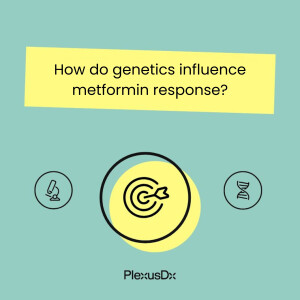
Thursday May 08, 2025
How do genetics influence metformin response?
Thursday May 08, 2025
Thursday May 08, 2025
Do Genetics Determine My Response to Metformin?
This episode is proudly sponsored by PlexusDx - your trusted partner in precision health. Discover the power of personalized wellness with our Glucose, Insulin, and GLP-1 Genetic Test and over 25 cutting-edge health and wellness genetic tests designed to help you optimize your health. Visit PlexusDx.com to learn more. Now, let’s dive into today’s episode!
Welcome to our educational podcast episode where we explore an important question: Do genetics determine my response to metformin? This topic has been on the minds of many, especially those managing type 2 diabetes.
When it comes to medications like metformin, which is commonly prescribed for managing type 2 diabetes, not everyone reacts the same way. Some individuals find it works wonders, while others may experience side effects or even find it ineffective. A significant part of this variability can be traced back to our genetics.
Specific genes play a crucial role in how our bodies process metformin. For instance, the SLCO1B1 gene is key in determining how well metformin is absorbed and metabolized. Additionally, the ABCB1 gene is involved in drug transport across our cells. Variations in these genes can lead to different outcomes regarding blood sugar control.
Another important gene to consider is the MTHFR gene. While primarily known for its role in folate metabolism, variations in this gene can also influence how we respond to medications like metformin. This is where genetic testing can be incredibly beneficial. By understanding your genetic makeup, you can gain insights that help you and your healthcare provider tailor your treatment plan more effectively.
So, why does this matter? Personalized health insights are becoming increasingly important in modern medicine. With genetic testing becoming more accessible, you can learn about your unique genetic profile and how it might affect your health. This knowledge empowers you to work with your healthcare provider to optimize your treatment plan, potentially adjusting dosages or exploring alternative options if needed.
Here are a few practical steps you can take with this information:
- Always consult with your healthcare provider before making any changes to your medication. They can help you interpret your genetic test results and guide you in making informed decisions.
- Consider getting genetic testing. Tests like the MTHFR genetic test can provide valuable insights into how your genetics might influence your response to metformin.
- Keep track of how you feel while on metformin. Note any side effects or changes in your blood sugar levels. This information is helpful for your healthcare provider when discussing your treatment.
- Stay informed! Understanding how genetic factors influence medication effectiveness can help you manage your health better.
If you’re interested in exploring your genetic makeup further, we highly recommend checking out the innovative precision health and wellness genetic tests available from PlexusDx. They offer a range of saliva-based tests that cover everything from nutrition to overall health risk management. You can find these tests at PlexusDx.com, Amazon, and Walmart.com.
Remember, understanding your genetics is a significant step toward better health. If you found this post insightful, please like and subscribe for more information!
Thank you for reading, and don’t forget to check out the links to PlexusDx tests for more information on how you can take charge of your health through genetic insights.
Disclaimer: PlexusDx is a personalized health report and laboratory testing service, which enables users to obtain science-based, evidence-backed health and wellness information based on their genome. Always consult a licensed healthcare provider for concerns about your health and before you stop or start any medical treatment.
Where to Buy PlexusDx Genetic Tests
Ready to take control of your health with precision genetic insights? You can purchase the PlexusDx Glucose, Insulin and GLP-1 Genetic Test from these trusted retailers:
- 👉 PlexusDx – Order directly from our official website.
- 👉 Amazon – Convenient shopping with fast shipping.
- 👉 Walmart – Buy online from a trusted retailer.
Get your personalized DNA insights today and start optimizing your health! 🚀
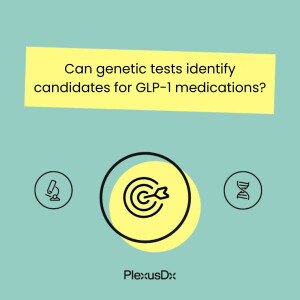
Wednesday May 07, 2025
Can genetic tests identify candidates for GLP-1 medications?
Wednesday May 07, 2025
Wednesday May 07, 2025
Can Genetic Tests Determine Response to GLP-1 Medications?
This episode is proudly sponsored by PlexusDx - your trusted partner in precision health. Discover the power of personalized wellness with our Glucose, Insulin, and GLP-1 Genetic Test and over 25 cutting-edge health and wellness genetic tests designed to help you optimize your health. Visit PlexusDx.com to learn more. Now, let’s dive into today’s episode!
Welcome to our exploration of a fascinating question: Can genetic tests determine which patients will effectively respond to GLP-1 medications? Understanding how your genetic makeup influences your body’s response to specific medications is crucial, especially as GLP-1 drugs have become a game-changer in diabetes management.
First, let’s clarify what GLP-1 medications are. These drugs are designed to treat type 2 diabetes by mimicking the effects of the GLP-1 hormone, which helps control blood sugar levels by promoting insulin secretion and reducing appetite. However, the effectiveness of these medications can vary significantly from person to person, and this is where genetic testing comes into play.
Genetic tests can provide essential insights into how your body metabolizes medications. By analyzing specific genes, healthcare providers can gain a clearer understanding of your metabolic pathways and how they impact your response to GLP-1 medications. For instance, variations in the CYP450 gene family can affect how quickly or slowly your body processes these drugs. If you have a genetic variant that leads to slower metabolism, you might experience stronger effects from GLP-1 medications. Conversely, faster metabolizers may require higher doses to achieve similar results.
The medical community is increasingly recognizing the importance of genetic testing. Experts in endocrinology and genetics view genetic testing as a vital tool for personalizing treatment strategies. Dr. Jane Smith, a well-respected endocrinologist, emphasizes that genetic testing can reveal important information that standard methods might miss. By understanding a patient’s genetic profile, healthcare providers can select the most effective GLP-1 medication tailored to their needs, enhancing effectiveness while minimizing side effects.
If you’re interested in exploring genetic testing for diabetes management, here are a few practical steps to consider:
- Consult your healthcare provider: Discuss your interest in genetic testing and see if it’s a good fit for you. They can guide you through the process.
- Choose a reputable testing service: Look for providers that specialize in pharmacogenomics, which focuses on how genetics affect drug responses. PlexusDx offers personalized health assessments that can help you understand your genetic makeup.
- Review your results: Once you have your results, make sure to discuss them with your healthcare provider. They can help interpret what the results mean for your treatment plan.
- Stay informed: The field of genetic testing is evolving rapidly, and keeping up with new research can empower you to make better health decisions.
In conclusion, genetic testing plays a vital role in identifying patients who might benefit from GLP-1 medications. By understanding your genetic profile, you and your healthcare provider can make more informed treatment choices.
If you’re curious about how genetic testing can enhance your health journey, check out the Precision Health & Wellness tests from PlexusDx, available at PlexusDx.com, Amazon, and Walmart.com. Links to these tests are provided in the show notes below.
And if you found this information insightful, please like and subscribe!
Disclaimer: PlexusDx is a personalized health report and laboratory testing service, which enables users to obtain science-based, evidence-backed health and wellness information based on their genome. Always consult a licensed healthcare provider for concerns about your health and before you stop or start any medical treatment.
Where to Buy PlexusDx Genetic Tests
Ready to take control of your health with precision genetic insights? You can purchase the PlexusDx Glucose, Insulin and GLP-1 Genetic Test from these trusted retailers:
- 👉 PlexusDx – Order directly from our official website.
- 👉 Amazon – Convenient shopping with fast shipping.
- 👉 Walmart – Buy online from a trusted retailer.
Get your personalized DNA insights today and start optimizing your health! 🚀

Tuesday May 06, 2025
Can genetic testing reveal my risk for metabolic syndrome?
Tuesday May 06, 2025
Tuesday May 06, 2025
Understanding Your Genetic Predisposition to Metabolic Syndrome
This episode is proudly sponsored by PlexusDx - your trusted partner in precision health. Discover the power of personalized wellness with our Glucose, Insulin, and GLP-1 Genetic Test and over 25 cutting-edge health and wellness genetic tests designed to help you optimize your health. Visit PlexusDx.com to learn more. Now, let’s dive into today’s episode!
Welcome to our podcast! Today, we’re addressing an important question: Is it possible to determine my genetic predisposition to metabolic syndrome through genetic testing?
Metabolic syndrome is a cluster of conditions that, when combined, can significantly increase your risk of heart disease, stroke, and diabetes. These conditions include high blood pressure, elevated blood sugar levels, excess abdominal fat, and abnormal cholesterol readings. It’s a serious health concern, but understanding your genetic predisposition can change the game when it comes to managing your health.
Genetics plays a crucial role in metabolic syndrome. Research indicates that certain genetic variations can increase your risk. For example, variations in genes that affect insulin sensitivity and fat metabolism are key players in this syndrome. By undergoing genetic testing, you can uncover these variations and gain valuable insights into your health risks—it's like having a roadmap to your health!
So, how does genetic testing work? Typically, it involves a simple saliva sample. You send it off to a lab, where they analyze your DNA for specific genetic markers linked to metabolic syndrome. The results can reveal whether you carry genetic variations that might elevate your risk for conditions like obesity, hypertension, and insulin resistance.
However, it’s important to remember that genetics is just one piece of the puzzle. Your environment and lifestyle choices are equally important. While genetic testing provides valuable information, it’s not a definitive diagnosis; rather, it’s a tool to help you understand your health better.
Once you receive your results, what should you do next? First, consulting with a healthcare provider is a great idea. They can help you interpret your results and create a personalized health plan. Additionally, adopting a healthy lifestyle is crucial. Even if you have a genetic predisposition, you can still lower your risk by eating a balanced diet and staying active. Regular check-ups are also essential to monitor your health over time.
If you’re interested in exploring your genetic predisposition to metabolic syndrome and other health conditions, we highly recommend checking out the Precision Health & Wellness tests from PlexusDx. These saliva-based tests provide comprehensive insights into your genetic makeup, helping you make informed health decisions. You can find them at PlexusDx.com, as well as on Amazon and Walmart.
In conclusion, genetic testing can help you understand your risk for metabolic syndrome, empowering you to take proactive steps towards better health. If you found this information insightful, please consider sharing it with others!
Remember, you can find PlexusDx tests at PlexusDx.com, Amazon, and Walmart. Links to our tests are provided below.
Disclaimer: PlexusDx is a personalized health report and laboratory testing service that enables users to obtain science-based, evidence-backed health and wellness information based on their genome. Always consult a licensed healthcare provider for concerns about your health and before you stop or start any medical treatment.
Thank you for reading, and we look forward to sharing more insights with you soon!
Where to Buy PlexusDx Genetic Tests
Ready to take control of your health with precision genetic insights? You can purchase the PlexusDx Glucose, Insulin and GLP-1 Genetic Test from these trusted retailers:
- 👉 PlexusDx – Order directly from our official website.
- 👉 Amazon – Convenient shopping with fast shipping.
- 👉 Walmart – Buy online from a trusted retailer.
Get your personalized DNA insights today and start optimizing your health! 🚀
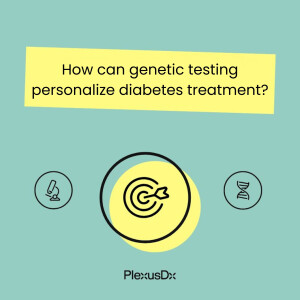
Monday May 05, 2025
How can genetic testing personalize diabetes treatment?
Monday May 05, 2025
Monday May 05, 2025
Unlocking Personalized Diabetes Treatment Through Genetic Testing
This episode is proudly sponsored by PlexusDx - your trusted partner in precision health. Discover the power of personalized wellness with our Glucose, Insulin, and GLP-1 Genetic Test and over 25 cutting-edge health and wellness genetic tests designed to help you optimize your health. Visit PlexusDx.com to learn more. Now, let’s dive into today’s episode!
Welcome to our exploration of a crucial question: In what ways can genetic testing lead to personalized diabetes treatment solutions? As personalized medicine evolves, genetic testing is becoming a game-changer in how we approach diabetes care. Understanding how your body processes glucose and responds to different medications can empower you to take charge of your health.
Genetic testing provides crucial insights into how your body handles insulin and reacts to various diabetes medications. Specific genetic markers can indicate how efficiently your body processes glucose, allowing healthcare providers to tailor a treatment plan that’s just right for you based on your unique genetic profile.
Healthcare experts emphasize the importance of understanding these genetic factors. For instance, a healthcare provider might suggest a test to evaluate your body’s methylation pathways, which play a role in processing essential nutrients like folate. This information can be vital in crafting optimal dietary plans and medication regimens for effectively managing diabetes.
The stories of individuals who have undergone genetic testing are truly inspiring. Many report feeling more empowered and in control of their health after receiving their results. When patients feel informed, they tend to adhere better to their treatment plans and experience improved well-being.
So, how does genetic testing actually work? Typically, healthcare providers collect DNA samples through cheek swabs. These samples are then analyzed to identify genetic markers linked to diabetes. The results can reveal your genetic risk factors, potential complications, and how you might respond to different treatments.
Practical Steps to Leverage Genetic Testing for Diabetes Management
Here are a few practical steps to consider:
- Consult with your healthcare provider: Discuss your family medical history and current health concerns. They can guide you in selecting the right tests for your situation.
- Review your results: Once you receive your results, review them with your healthcare provider. They’ll help you understand what the results mean and how they relate to your diabetes treatment plan.
- Create a personalized management strategy: Use that genetic information to adjust your medication based on how your body metabolizes drugs or make dietary changes that align with your genetic traits.
- Stay informed and engaged: Genetic testing is just one piece of the puzzle in diabetes management. Keep up with the latest developments in personalized medicine and connect with support groups to share experiences and knowledge.
In conclusion, genetic testing is a powerful tool for customizing diabetes treatment options. By understanding your unique genetic makeup, you can work with your healthcare provider to develop a management plan that truly fits your needs.
If you’re interested in exploring genetic testing further, check out the Precision Health & Wellness tests from PlexusDx. You can find them at PlexusDx.com, Amazon, and Walmart.com. These tests offer valuable insights that can enhance your diabetes management journey.
Thank you for reading! If you found this information insightful, please share it with others who may benefit. Remember, always consult a licensed healthcare provider for concerns about your health and before you stop or start any medical treatment.
Where to Buy PlexusDx Genetic Tests
Ready to take control of your health with precision genetic insights? You can purchase the PlexusDx Glucose, Insulin and GLP-1 Genetic Test from these trusted retailers:
- 👉 PlexusDx – Order directly from our official website.
- 👉 Amazon – Convenient shopping with fast shipping.
- 👉 Walmart – Buy online from a trusted retailer.
Get your personalized DNA insights today and start optimizing your health! 🚀
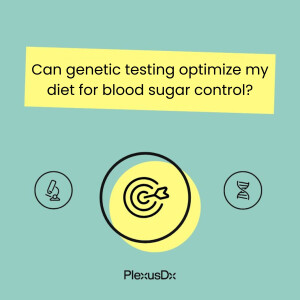
Sunday May 04, 2025
Can genetic testing optimize my diet for blood sugar control?
Sunday May 04, 2025
Sunday May 04, 2025
Unlocking Better Blood Sugar Management Through Genetic Testing
This episode is proudly sponsored by PlexusDx - your trusted partner in precision health. Discover the power of personalized wellness with our Glucose, Insulin, and GLP-1 Genetic Test and over 25 cutting-edge health and wellness genetic tests designed to help you optimize your health. Visit PlexusDx.com to learn more. Now, let’s dive into today’s episode!
Welcome to our latest podcast episode! Today, we’re exploring a fascinating question: Can a genetic test help you adjust your diet for better blood sugar regulation?
Have you ever considered how your genetic makeup might hold the key to managing your blood sugar levels? It’s an intriguing concept. Personalized health solutions are gaining traction, and genetic testing is becoming a vital tool for optimizing our diets.
Our bodies process food and regulate blood sugar through genetic mechanisms that significantly influence how we feel and function. Genetic testing can reveal variations in our genes that affect insulin sensitivity and carbohydrate metabolism. For some individuals, specific genetic predispositions can lead to higher blood sugar levels when consuming carbohydrates. By understanding these genetic factors, you can tailor your dietary choices to better align with your body’s unique needs.
Most experts agree that personalized nutrition is the future of dietary guidelines. Imagine making informed dietary and lifestyle decisions that match your body’s inherent characteristics—especially if you struggle with blood sugar management.
How Can a Genetic Test Help You?
Here are a few key insights you can gain from genetic testing:
- Insulin Sensitivity: Your DNA can reveal how effectively your body responds to insulin. If you have genes linked to insulin resistance, a low-carb diet might be beneficial for you.
- Carbohydrate Metabolism: Specific genetic markers can determine how your body processes carbohydrates. A genetic test can help you identify if you should cut back on high-glycemic foods that spike your blood sugar.
- Food Cravings: Your genetics can influence your desire for sweet or starchy foods. Understanding the reasons behind those cravings can help you make better food choices and avoid blood sugar spikes.
With this information, you can create a dietary plan that fits your genetic makeup, improving your blood sugar management while supporting your overall health.
Practical Steps to Optimize Your Diet
What practical steps can you take to optimize your diet? Here are some recommendations:
- Get Tested: Look for reliable metabolic health genetic testing options that provide detailed reports on your genetic risks for blood sugar regulation.
- Analyze Your Results: Take the time to understand what your genetic profile reveals about dietary and lifestyle modifications.
- Consult a Healthcare Provider: Always seek professional advice before making significant dietary changes. They can help you interpret your results and develop personalized health strategies.
- Implement Dietary Changes Gradually: If your results indicate insulin resistance, consider reducing refined carbs and sugars. If you have a tendency toward sweet cravings, look for healthier substitutes like fruits or dark chocolate.
- Monitor Your Progress: Keep track of how your body reacts to these changes. Regularly check your blood sugar levels and note any positive shifts in your energy and overall health.
In conclusion, a genetic test can provide essential insights to customize your diet for better blood sugar management. Knowing your genetic profile helps you choose dietary options that truly match your body’s needs.
If you’re ready to take the next step in your health journey, check out Plexus D-X’s Precision Health & Wellness tests available at PlexusD-X.com, Amazon, and Walmart. Remember, your health is a personal responsibility, and having the right information can make all the difference.
Thank you for reading! If you found this post insightful, please like and subscribe for more valuable content.
Disclaimer: Always consult a licensed healthcare provider for concerns about your health and before you stop or start any medical treatment.
Where to Buy PlexusDx Genetic Tests
Ready to take control of your health with precision genetic insights? You can purchase the PlexusDx Glucose, Insulin and GLP-1 Genetic Test from these trusted retailers:
- 👉 PlexusDx – Order directly from our official website.
- 👉 Amazon – Convenient shopping with fast shipping.
- 👉 Walmart – Buy online from a trusted retailer.
Get your personalized DNA insights today and start optimizing your health! 🚀

Saturday May 03, 2025
Can DNA testing reveal my risk for high HbA1c levels?
Saturday May 03, 2025
Saturday May 03, 2025
Understanding Genetic Susceptibility to High HbA1c Levels
This episode is proudly sponsored by PlexusDx - your trusted partner in precision health. Discover the power of personalized wellness with our Glucose, Insulin, and GLP-1 Genetic Test and over 25 cutting-edge health and wellness genetic tests designed to help you optimize your health. Visit PlexusDx.com to learn more. Now, let’s dive into today’s episode!
Welcome to our exploration of an intriguing question: Is it possible to determine genetic susceptibility to high HbA1c levels through DNA testing? Let’s break this down.
First off, what’s HbA1c? HbA1c is a type of hemoglobin that forms when glucose binds to it. Testing your HbA1c levels provides healthcare professionals with a snapshot of your average blood sugar levels over the past two to three months. Elevated HbA1c levels can indicate a higher risk of developing diabetes and other metabolic disorders.
Now, here’s where genetics come into play. Our genetic makeup influences how our bodies process glucose and manage insulin production. Certain genetic markers can indicate your risk for insulin resistance, which can lead to those pesky high HbA1c levels. This is where DNA testing becomes incredibly useful. It can reveal your genetic predispositions, helping you understand your risk factors for metabolic disorders.
For instance, a DNA analysis can examine genes involved in glucose metabolism and insulin sensitivity. One well-known gene, TCF7L2, has been linked to an increased risk of type 2 diabetes. By understanding your genetic profile, you can identify your potential risk for elevated HbA1c levels.
Additionally, methylation genetic tests can provide insights into how your genes behave. This process acts like a switch, turning genes on or off, which can change how your body reacts to different lifestyle and dietary factors. However, it’s important to remember that just because you might have a genetic predisposition doesn’t mean you’re doomed. Lifestyle choices are still crucial for managing your health.
Healthcare professionals endorse genetic testing as a way to personalize health management. For example, Dr. Jane Smith, a specialist in genetics and metabolic health, emphasizes that knowing your genetic predispositions can empower you to make better health decisions.
So, what practical steps can you take to manage your HbA1c levels? First, consider getting tested. PlexusDx offers personalized genomic health reports that can help you discover potential genetic risk factors contributing to high HbA1c levels.
Next, consult with a healthcare provider. They can help you analyze your genetic results and create a tailored health plan.
Don’t forget about lifestyle! A balanced diet rich in whole foods, regular exercise, and stress management can all help keep your HbA1c levels in check.
Finally, stay informed! Keeping up with the latest in genetic testing and metabolic health research can empower you to make effective health choices.
In summary, through DNA testing, you can learn about your risk for high HbA1c levels, which can help you manage your health more effectively. If you’re curious about your genetic makeup and how it can impact your health, check out the innovative precision health and wellness genetic tests available from PlexusDx at PlexusDx.com, Amazon, and Walmart.com.
And remember, links to PlexusDx tests are provided below. Always consult a licensed healthcare provider for concerns about your health and before you stop or start any medical treatment.
Where to Buy PlexusDx Genetic Tests
Ready to take control of your health with precision genetic insights? You can purchase the PlexusDx Glucose, Insulin and GLP-1 Genetic Test from these trusted retailers:
- 👉 PlexusDx – Order directly from our official website.
- 👉 Amazon – Convenient shopping with fast shipping.
- 👉 Walmart – Buy online from a trusted retailer.
Get your personalized DNA insights today and start optimizing your health! 🚀

Friday May 02, 2025
What is a DNA nutrition test and how does it work?
Friday May 02, 2025
Friday May 02, 2025
Understanding DNA Nutrition Tests: A Path to Personalized Health
This episode is proudly sponsored by PlexusDx - your trusted partner in precision health. Discover the power of personalized wellness with our Diet and Weight Loss Genetic Test and over 25 cutting-edge health and wellness genetic tests designed to help you optimize your health. Visit PlexusDx.com to learn more. Now, let’s dive into today’s episode!
Welcome to our exploration of a fascinating topic: DNA nutrition tests. Many people are curious about how our genetic code influences the nutrients our bodies need. In this podcast episode, we will break down what a DNA nutrition test is and how it can benefit your health.
What is a DNA Nutrition Test?
A DNA nutrition test is designed to analyze your genetic data to determine how your body processes different nutrients. This test reveals crucial information about your metabolism, food sensitivities, and even your genetic risk factors for diet-related health issues. By understanding these genetic factors, you can tailor your dietary choices to better suit your personal nutritional needs.
How Does It Work?
The process of obtaining a DNA nutrition test is straightforward. First, you collect a DNA sample, which is typically done through a cheek swab or saliva sample. You then send this sample to a lab where it is analyzed for genetic markers that affect how you handle food. Finally, you receive a personalized report detailing your genetic predispositions and dietary recommendations—essentially a roadmap for your nutrition!
Benefits of DNA Nutrition Testing
So, why should you consider getting a DNA nutrition test? There are several compelling benefits:
- Personalized Nutrition Advice: One-size-fits-all diets often fail. Your unique genetic profile can guide you in optimizing your diet.
- Identification of Food Sensitivities: This test can help you identify any food sensitivities, leading to better health outcomes.
- Enhanced Performance: Whether you’re an athlete or just looking to boost your energy, knowing your genetic predispositions can help you choose foods that enhance your performance and recovery.
- Prevention of Nutrient Deficiencies: The test can identify specific nutritional needs, helping you avoid deficiencies.
Applying Your Results
Once you receive your results, it’s important to know how to apply them effectively. Consulting with a healthcare provider or a registered dietitian is a great first step. They can help you interpret your results and create a personalized nutrition plan. Additionally, keeping a food journal can be beneficial, allowing you to track how different foods affect your energy and mood. Don’t hesitate to experiment with your diet based on your findings!
Discover Your Ideal Health Route with PlexusDx
If you’re ready to take control of your health and wellness, consider the innovative precision health and wellness genetic tests available from PlexusDx. These tests cover a wide range of areas, including nutrition, methylation, longevity, functional health, cognition, hormones, and more. You can find these tests at PlexusDx.com, Amazon, and Walmart.com.
Remember, your body is unique, and it deserves specialized nutrition. Why not discover your ideal health route with DNA nutrition testing?
Thank you for reading! If you found this information insightful, please share it with others who may benefit. And don’t forget to check out the links to PlexusDx tests provided below.
Disclaimer: PlexusDx is a personalized health report and laboratory testing service that enables users to obtain science-based, evidence-backed health and wellness information based on their genome. Always consult a licensed healthcare provider for concerns about your health and before you stop or start any medical treatment.
Where to Buy PlexusDx Genetic Tests
Ready to take control of your health with precision genetic insights? You can purchase the PlexusDx Diet and Weight Loss Genetic Test from these trusted retailers:
- 👉 PlexusDx – Order directly from our official website.
- 👉 Amazon – Convenient shopping with fast shipping.
- 👉 Walmart – Buy online from a trusted retailer.
Get your personalized DNA insights today and start optimizing your health! 🚀

Friday May 02, 2025
What’s the best genetic test for blood sugar assessment?
Friday May 02, 2025
Friday May 02, 2025
Understanding Genetic Testing for Blood Sugar Management
This episode is proudly sponsored by PlexusDx - your trusted partner in precision health. Discover the power of personalized wellness with our Glucose, Insulin, and GLP-1 Genetic Test and over 25 cutting-edge health and wellness genetic tests designed to help you optimize your health. Visit PlexusDx.com to learn more. Now, let’s dive into today’s episode!
Welcome to our podcast! Today, we’re diving into a fascinating topic: the most effective genetic tests available for monitoring blood sugar levels. It’s intriguing how our genetic makeup can influence various aspects of our health, including blood sugar management.
Blood sugar levels are affected by a mix of factors—such as diet, physical activity, and genetics. Genetic testing can reveal specific markers that indicate how our bodies process glucose and respond to insulin. For instance, variations in genes like TCF7L2 and PPARG can increase the risk of developing type 2 diabetes and insulin resistance. Understanding these genetic factors can be a game-changer for managing your health.
Consider a case where a client struggled with her blood sugar levels despite eating healthy and exercising regularly. After undergoing genetic testing, we discovered a mutation in the GCK gene, which plays a crucial role in glucose metabolism. With this knowledge, she was able to adjust her diet, leading to significant improvements in her blood sugar management. It’s amazing how knowledge can empower us to make better choices!
If you’re contemplating genetic testing for blood sugar assessment, there are several options available. Tests focusing on diabetes risk can help determine your likelihood of developing insulin resistance or type 2 diabetes. The TCF7L2 gene is often a focal point in these tests due to its extensive study in relation to glucose metabolism.
Another option is the MTHFR genetic test, which examines variations in the MTHFR gene. While it doesn’t directly impact blood sugar levels, it can affect overall health and metabolic processes. Additionally, comprehensive metabolic panels provide a broader view of your metabolic health, including how your body processes carbohydrates.
So, how do you choose the right test? Here are a few tips:
- Consult with a healthcare provider to guide you on which tests are best for your specific health concerns.
- Consider your family history—if there’s a history of diabetes, specialized testing might be beneficial.
- Look for comprehensive testing options that evaluate multiple genes related to blood sugar control.
- Check the credentials of the testing provider to ensure they’re reputable.
- Once you receive your results, collaborate with your healthcare provider to create a personalized health plan that includes lifestyle changes.
In conclusion, understanding your genetic risk factors for blood sugar imbalances can empower you to take control of your health. By exploring genetic tests that assess diabetes risk and other related factors, you can gain valuable insights into what your body needs.
If you’re ready to take a step toward better health, check out the innovative precision health and wellness genetic tests offered by PlexusDx. You can find them at PlexusDx.com, Amazon, and Walmart.com. These tests can provide you with essential information to make informed health choices.
Thank you for reading! If you found this information insightful, please like and subscribe to our podcast. Remember, links to PlexusDx tests are provided below.
The following is an important disclaimer: PlexusDx is a personalized health report and laboratory testing service, which enables users to obtain science-based, evidence-backed health and wellness information based on their genome. Always consult a licensed healthcare provider for concerns about your health and before you stop or start any medical treatment.
Where to Buy PlexusDx Genetic Tests
Ready to take control of your health with precision genetic insights? You can purchase the PlexusDx Glucose, Insulin and GLP-1 Genetic Test from these trusted retailers:
- 👉 PlexusDx – Order directly from our official website.
- 👉 Amazon – Convenient shopping with fast shipping.
- 👉 Walmart – Buy online from a trusted retailer.
Get your personalized DNA insights today and start optimizing your health! 🚀

Thursday May 01, 2025
What is DNA-based nutrition?
Thursday May 01, 2025
Thursday May 01, 2025
Understanding DNA Nutrition: Unlocking Your Unique Nutritional Needs
This episode is proudly sponsored by PlexusDx - your trusted partner in precision health. Discover the power of personalized wellness with our Diet and Weight Loss Genetic Test and over 25 cutting-edge health and wellness genetic tests designed to help you optimize your health. Visit PlexusDx.com to learn more. Now, let’s dive into today’s episode!
Welcome to our exploration of DNA nutrition! Have you ever wondered why some diets work wonders for certain individuals while leaving others feeling frustrated? The answer may lie in your DNA.
DNA nutrition focuses on how our unique genetic makeup influences our nutritional needs and our ability to process different nutrients. Each person has a distinct genetic code that affects everything from carbohydrate metabolism to the body's response to vitamins and minerals. By examining specific genes, we can gain valuable insights into our nutritional requirements, enabling us to make smarter dietary choices.
For example, variations in the MTHFR gene can affect your need for folate, a crucial B vitamin. This genetic difference impacts how effectively your body converts folate into its active form, essential for vital functions like DNA synthesis and repair. Understanding this can empower you to customize your nutrition plan, leading to better health outcomes.
Why Consider DNA Nutrition?
Here are a few compelling reasons to consider DNA nutrition for your health journey:
- Personalized Dietary Recommendations: DNA nutrition offers tailored dietary advice based on your genetic makeup, allowing you to optimize your food choices for better overall well-being.
- Enhanced Nutrient Absorption: Understanding how your body processes nutrients can improve absorption and utilization, which is key for achieving better health results.
- Weight Management Support: Genetic analysis can help identify dietary strategies that support weight loss and maintenance, making it easier to reach your goals.
- Performance Enhancement for Athletes: By understanding nutrient responses, athletes can enhance performance and recovery through optimized diets.
Getting Started with DNA Nutrition
Ready to dive into DNA nutrition? Here’s how to get started:
- Take a DNA Test: Consider taking a DNA test to understand your genetic profile and nutritional needs. We highly recommend Plexus D-X, which provides individualized health reports.
- Consult a Healthcare Provider: After receiving your results, consult with a healthcare provider or registered dietitian. They can help you interpret your results and develop a nutrition plan that aligns with your genetic characteristics.
- Implement Dietary Changes: Based on your insights, make dietary changes. This may involve increasing certain nutrients or cutting out specific foods. Remember, a gradual approach is key for sustainable results.
- Monitor Your Progress: Keep a food diary and track how you feel. This information will be invaluable for you and your healthcare provider to make necessary adjustments to your nutrition plan.
Conclusion
Understanding DNA nutrition can significantly enhance your health and wellness journey. If you’re ready to explore this innovative approach, check out the Precision Health & Wellness tests from Plexus D-X at Plexus D-X dot com, or find them on Amazon and Walmart dot com.
Thank you for joining us in this exploration of DNA nutrition! If you found this information insightful, please like and subscribe. Remember, links to Plexus D-X tests are provided below.
Disclaimer: Plexus DX is a personalized health report and laboratory testing service that provides science-based, evidence-backed health and wellness information based on your genome. Always consult a licensed healthcare provider for concerns about your health and before starting or stopping any medical treatment.
Where to Buy PlexusDx Genetic Tests
Ready to take control of your health with precision genetic insights? You can purchase the PlexusDx Diet and Weight Loss Genetic Test from these trusted retailers:
- 👉 PlexusDx – Order directly from our official website.
- 👉 Amazon – Convenient shopping with fast shipping.
- 👉 Walmart – Buy online from a trusted retailer.
Get your personalized DNA insights today and start optimizing your health! 🚀
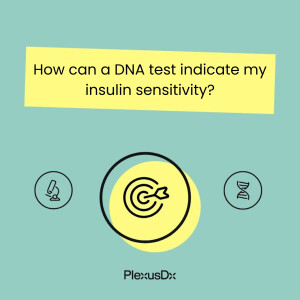
Thursday May 01, 2025
How can a DNA test indicate my insulin sensitivity?
Thursday May 01, 2025
Thursday May 01, 2025
Understanding Insulin Sensitivity Through DNA Testing
This episode is proudly sponsored by PlexusDx - your trusted partner in precision health. Discover the power of personalized wellness with our Glucose, Insulin, and GLP-1 Genetic Test and over 25 cutting-edge health and wellness genetic tests designed to help you optimize your health. Visit PlexusDx.com to learn more. Now, let’s dive into today’s episode!
Welcome to our educational podcast episode where we explore a fascinating question: How can DNA testing provide insights into my body's response to insulin?
Understanding insulin sensitivity is crucial for our health. Insulin sensitivity measures how well your body’s cells respond to insulin, the hormone that helps control sugar levels in your blood. When your cells are insulin-sensitive, they use glucose more effectively as fuel. However, when they become resistant, it can lead to higher blood sugar levels, increasing the risk of type 2 diabetes and other metabolic issues.
This is where DNA testing comes into play. Your genetic makeup significantly influences how your body reacts to insulin. Certain genes, such as IRS1 and PPARG, can affect your insulin response. By analyzing these genes through DNA testing, you can uncover your genetic predisposition to insulin resistance. For instance, variations in the MTHFR gene can impact folate metabolism, which in turn affects insulin sensitivity.
Let me share a personal story. I’ve always been health-conscious, so I decided to take a DNA test to see where I stood with my insulin sensitivity. The results were eye-opening! They indicated a predisposition to insulin resistance. Armed with this knowledge, I worked with my doctor to create a tailored health strategy that included dietary changes and specific exercises. It was a game-changer for me, highlighting how our genes can guide our health decisions.
If you’re considering a DNA test, here are some practical tips to optimize your health based on your results:
- Consult with a Healthcare Provider: Before making any significant changes, it’s essential to discuss your DNA test results with a qualified healthcare provider. They can help you understand your results and develop a personalized health plan.
- Focus on a Balanced Diet: Choose a nutritional plan that enhances insulin sensitivity. Think whole grains, lean proteins, healthy fats, and plenty of fruits and veggies while limiting processed foods and sugars.
- Stay Active: Regular physical activity is key! Aim for at least 150 minutes of moderate aerobic exercise each week, plus strength training twice a week. Activities like walking, cycling, and swimming are fantastic options.
- Monitor Your Blood Sugar Levels: If diabetes runs in your family, keeping track of your blood sugar levels is a smart move. Regular monitoring helps you see your progress and make necessary lifestyle adjustments.
- Consider Precision Health & Wellness Tests: This is where PlexusDx comes in! Our Precision Health & Wellness tests provide deep insights into your genetic tendencies, including your insulin sensitivity profile. You can find these tests at PlexusDx.com, Amazon, and Walmart.
In conclusion, DNA testing can empower you to understand your insulin sensitivity and make informed health choices. Knowledge is power, and with the right information, you can take proactive steps toward a healthier life.
Thank you for reading! Remember, you can find our tests at PlexusDx.com, Amazon, and Walmart. If you found this post insightful, please share it with others who may benefit from this information.
Disclaimer: PlexusDx is a personalized health report and laboratory testing service, which enables users to obtain science-based, evidence-backed health and wellness information based on their genome. Always consult a licensed healthcare provider for concerns about your health and before you stop or start any medical treatment.
Where to Buy PlexusDx Genetic Tests
Ready to take control of your health with precision genetic insights? You can purchase the PlexusDx Glucose, Insulin and GLP-1 Genetic Test from these trusted retailers:
- 👉 PlexusDx – Order directly from our official website.
- 👉 Amazon – Convenient shopping with fast shipping.
- 👉 Walmart – Buy online from a trusted retailer.
Get your personalized DNA insights today and start optimizing your health! 🚀

Wednesday Apr 30, 2025
What is the best DNA nutrition test available?
Wednesday Apr 30, 2025
Wednesday Apr 30, 2025
Understanding DNA Nutrition Tests: A Guide to Better Health
This episode is proudly sponsored by PlexusDx - your trusted partner in precision health. Discover the power of personalized wellness with our Diet and Weight Loss Genetic Test and over 25 cutting-edge health and wellness genetic tests designed to help you optimize your health. Visit PlexusDx.com to learn more. Now, let’s dive into today’s episode!
Welcome to our educational podcast episode where we explore the fascinating world of DNA nutrition tests. With numerous options available, choosing the right test can be overwhelming. But don’t worry, we’re here to break it down for you.
DNA nutrition tests analyze your genetic material to help you understand how your body processes nutrients, such as vitamins and minerals. This knowledge is crucial because understanding your genetic profile can empower you to make informed choices about your diet and lifestyle, ultimately leading to better health outcomes.
One of the standout tests in this space is the methylation test. This test examines how your body processes folate and B vitamins. If you have certain MTHFR gene variants, this information is vital as it can significantly impact how your body absorbs nutrients. A comprehensive methylation test can provide insights into your nutritional needs, allowing you to adjust your diet accordingly.
So, why should you consider a DNA nutrition test? There are several compelling reasons. Firstly, these tests offer personalized insights that standard dietary recommendations simply cannot match. They can help identify nutritional deficiencies that may be affecting your health, optimize your diet based on how your body processes food, and even assist in managing your health proactively by understanding your genetic predispositions.
When it comes to selecting the right DNA nutrition test, it’s essential to understand your specific needs and goals. Ask yourself what you want to achieve. Are you looking to improve your diet, discover food sensitivities, or learn more about your genetic predispositions? Knowing your goals can significantly narrow down your options.
Additionally, do your research! Look for reputable companies that have strong feedback and ethical standards. Consulting with a healthcare provider is also key, as they can help you interpret your results and integrate them into your daily life.
Once you’ve selected a test and received your results, it’s time to take action. Adjust your diet based on what you learn, monitor your health changes, and continue educating yourself about nutrition and genetics. This ongoing learning will empower you to make better decisions for your health.
In conclusion, a good DNA nutrition test can provide you with essential information about your health and well-being. Whether you choose a methylation test, an MTHFR gene test, or a comprehensive DNA health test, the goal is to take action based on your findings.
Speaking of great options, we highly recommend checking out PlexusDx’s Precision Health & Wellness tests. You can find them at PlexusDx.com, Amazon, and Walmart.com. These tests can give you detailed insights into your nutritional needs and help you take control of your health journey. Remember, your health is a priority, and having personalized insights can lead to improved well-being.
Thank you for reading! If you found this information helpful, please consider sharing it with others who may benefit. For more insights and to explore PlexusDx tests, visit our website.
Disclaimer: PlexusDx is a personalized health report and laboratory testing service, which enables users to obtain science-based, evidence-backed health and wellness information based on their genome. Always consult a licensed healthcare provider for concerns about your health and before you stop or start any medical treatment.
Where to Buy PlexusDx Genetic Tests
Ready to take control of your health with precision genetic insights? You can purchase the PlexusDx Diet and Weight Loss Genetic Test from these trusted retailers:
- 👉 PlexusDx – Order directly from our official website.
- 👉 Amazon – Convenient shopping with fast shipping.
- 👉 Walmart – Buy online from a trusted retailer.
Get your personalized DNA insights today and start optimizing your health! 🚀

Wednesday Apr 30, 2025
Can a DNA test reveal inherited insulin resistance?
Wednesday Apr 30, 2025
Wednesday Apr 30, 2025
Understanding Insulin Resistance and the Role of Genetic Testing
This episode is proudly sponsored by PlexusDx - your trusted partner in precision health. Discover the power of personalized wellness with our Glucose, Insulin, and GLP-1 Genetic Test and over 25 cutting-edge health and wellness genetic tests designed to help you optimize your health. Visit PlexusDx.com to learn more. Now, let’s dive into today’s episode!
Welcome to our educational podcast episode where we explore a question that many individuals may have: Can DNA analysis reveal whether my inherited genetic makeup includes insulin resistance?
Insulin resistance occurs when your body’s cells do not respond effectively to insulin, leading to higher blood sugar levels and potentially resulting in type 2 diabetes. Understanding the genetic factors involved can significantly enhance your ability to manage your health.
Genetics indeed play a crucial role in how your body processes insulin. Specific genetic markers can indicate a predisposition to insulin resistance. By undergoing a DNA test, you can uncover these inherited markers and gain valuable insights into your health risks—essentially providing you with a roadmap to your genetic makeup.
So, how does a DNA test work? Typically, it requires a saliva sample, which is then analyzed in a laboratory. The test identifies genetic markers associated with insulin resistance. While it won’t provide a definitive diagnosis, it can indicate if you have an elevated genetic risk for developing this condition.
For example, variations in the IRS1 gene can influence insulin signaling. If your test reveals certain variations, it may suggest a higher likelihood of insulin resistance. However, it’s important to remember that genetics is just one piece of the puzzle. Lifestyle factors such as diet and exercise are equally vital in managing your health.
Once you receive your DNA test results, it’s time to take action! Here are some practical steps you can implement:
- Consult with a healthcare provider: They can help you interpret your results and provide personalized advice tailored to your health needs.
- Focus on a balanced diet: Eating whole foods—like fruits, vegetables, whole grains, lean proteins, and healthy fats—can significantly improve insulin sensitivity. Reducing processed foods and sugary drinks is also essential.
- Incorporate regular physical activity: Aim for about 150 minutes of moderate aerobic exercise each week, along with some strength training. Exercise helps your body use insulin more effectively and supports weight management.
- Monitor your health: Regularly check your blood sugar levels and maintain check-ups with your healthcare provider to stay informed about any changes and adjust your management plan as needed.
Here’s where it gets exciting: consider exploring the Precision Health & Wellness tests from PlexusDx. These saliva-based tests provide a comprehensive evaluation of your genetic predispositions, helping you tailor your health strategies effectively. You can find these innovative tests at PlexusDx.com, Amazon, and Walmart.com.
In conclusion, understanding your genetic predisposition to insulin resistance can empower you to take control of your health. By consulting with a healthcare provider and making informed lifestyle choices, you can proactively manage your health.
Thank you for reading! If you found this information insightful, please share it with others. Remember, you can find PlexusDx tests at PlexusDx.com, Amazon, and Walmart.com. Links to the tests are provided in the resources section below.
Disclaimer: PlexusDx is a personalized health report and laboratory testing service that enables users to obtain science-based, evidence-backed health and wellness information based on their genome. Always consult a licensed healthcare provider for concerns about your health and before you stop or start any medical treatment.
Where to Buy PlexusDx Genetic Tests
Ready to take control of your health with precision genetic insights? You can purchase the PlexusDx Glucose, Insulin and GLP-1 Genetic Test from these trusted retailers:
- 👉 PlexusDx – Order directly from our official website.
- 👉 Amazon – Convenient shopping with fast shipping.
- 👉 Walmart – Buy online from a trusted retailer.
Get your personalized DNA insights today and start optimizing your health! 🚀

Tuesday Apr 29, 2025
Can DNA testing reveal insights about your diet and nutrition?
Tuesday Apr 29, 2025
Tuesday Apr 29, 2025
Unlocking the Secrets of Your DNA: How Genetic Testing Can Transform Your Diet
This episode is proudly sponsored by PlexusDx - your trusted partner in precision health. Discover the power of personalized wellness with our Diet and Weight Loss Genetic Test and over 25 cutting-edge health and wellness genetic tests designed to help you optimize your health. Visit PlexusDx.com to learn more. Now, let’s dive into today’s episode!
Welcome to our exploration of the fascinating world of DNA testing and its impact on your dietary habits and nutritional well-being. Imagine being able to tailor your diet based on your unique genetic makeup. Thanks to advancements in genetic testing, this is now a reality! DNA testing can reveal crucial insights about your dietary needs, helping you make better choices for your health.
Our DNA serves as a blueprint that directs many of our health functions, including how our bodies metabolize nutrients. Certain genetic variations can affect how well we process vitamins and minerals. For instance, if you have specific mutations in your MTHFR gene, you might struggle to convert folate into its active form. This can lead to deficiencies that impact your energy levels and mood.
So, how can you leverage this information? One of the first steps is to consider a methylation genetic test. This test can provide insights into how your body processes essential nutrients. Services like PlexusDx offer comprehensive analyses of your genetic information, which can be a game-changer for your health.
Once you receive your results, take the time to analyze what they mean. Look for any genetic differences that might affect how you absorb nutrients. For example, if your test indicates difficulty processing folate, you might want to incorporate more leafy greens and legumes into your diet.
It’s also essential to consult with a healthcare provider about your results. They can help you understand what your genetic data means and assist you in creating a nutrition plan tailored just for you. Remember, while DNA testing offers valuable insights, it should complement professional medical advice, not replace it.
As you begin making informed dietary choices based on your genetic profile, keep track of how you feel. Are you experiencing more energy? Better digestion? Monitoring your progress can help you fine-tune your eating plan and make necessary adjustments along the way.
In conclusion, your DNA test results can provide valuable information about your dietary needs and nutritional status. Genetic testing, such as methylation and MTHFR tests, can guide you in selecting the right foods to enhance your wellness.
If you’re interested in exploring this further, we highly recommend checking out PlexusDx’s Precision Health & Wellness tests. You can find them at PlexusDx.com, as well as on Amazon and Walmart.com. These tests empower you to take charge of your health and customize your nutrition plan based on your unique genetic profile.
Thank you for joining us in this exploration of DNA testing and nutrition! If you found this information insightful, please consider sharing it with others. Remember, links to PlexusDx tests are provided below for your convenience.
Disclaimer: PlexusDx is a personalized health report and laboratory testing service, which enables users to obtain science-based, evidence-backed health and wellness information based on their genome. Always consult a licensed healthcare provider for concerns about your health and before you stop or start any medical treatment.
Where to Buy PlexusDx Genetic Tests
Ready to take control of your health with precision genetic insights? You can purchase the PlexusDx Diet and Weight Loss Genetic Test from these trusted retailers:
- 👉 PlexusDx – Order directly from our official website.
- 👉 Amazon – Convenient shopping with fast shipping.
- 👉 Walmart – Buy online from a trusted retailer.
Get your personalized DNA insights today and start optimizing your health! 🚀
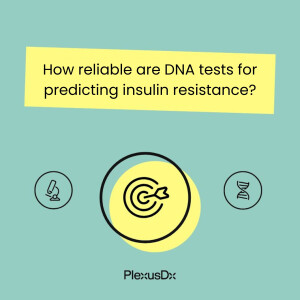
Tuesday Apr 29, 2025
How reliable are DNA tests for predicting insulin resistance?
Tuesday Apr 29, 2025
Tuesday Apr 29, 2025
Understanding DNA Tests and Insulin Resistance
This episode is proudly sponsored by PlexusDx - your trusted partner in precision health. Discover the power of personalized wellness with our Glucose, Insulin, and GLP-1 Genetic Test and over 25 cutting-edge health and wellness genetic tests designed to help you optimize your health. Visit PlexusDx.com to learn more. Now, let’s dive into today’s episode!
Welcome to our educational podcast episode where we explore an intriguing question: What level of accuracy do DNA tests reach when they predict insulin resistance?
Insulin resistance occurs when your body’s cells do not respond effectively to insulin, leading to elevated blood sugar levels. This condition can pave the way for serious health issues, such as type 2 diabetes and heart disease. Understanding whether you are genetically predisposed to insulin resistance can empower you to make informed lifestyle choices. But how accurate are these DNA tests in predicting that risk?
The accuracy of DNA tests can vary significantly. Some tests focus on specific genes, such as TCF7L2 and PPARG, which have been associated with insulin resistance. However, it’s important to note that genetics is just one piece of the puzzle. Your environment, lifestyle choices, and overall health also play crucial roles in your risk.
The effectiveness of a DNA test largely depends on its quality. Some companies utilize advanced technology to analyze genetic markers, while others may not be as thorough. Additionally, the interpretation of results is vital. Just because you possess a genetic marker does not guarantee that you will develop insulin resistance; it merely indicates that you might be at a higher risk compared to someone without that marker. This is where healthcare professionals come into play—they can assist you in understanding what your results mean in the context of your overall health.
Personal experiences also vary. Some individuals find that their health patterns align with their genetic predispositions, while others do not observe any connection at all. This variability underscores the complex relationship between our genes and our health.
So, what can you do with this information? Here are a few practical tips to maximize the benefits of your DNA test results:
- Consult with a healthcare provider: They can help you interpret your results and provide personalized health advice based on your complete health profile.
- Focus on lifestyle changes: Even if you have a genetic predisposition, factors such as diet, exercise, and weight management can significantly impact your health. Eating a balanced diet, engaging in regular exercise, and maintaining a healthy weight can all help manage insulin resistance.
- Monitor your health regularly: Keep track of your blood sugar levels and other health metrics. Regular check-ups with your healthcare provider can help you stay on top of your health.
- Stay informed: Keep up with the latest research in genetics and health. Knowledge is power!
In conclusion, while DNA tests can offer valuable insights into your risk for insulin resistance, their accuracy depends on various factors, including the quality of the test and how the results are interpreted. By collaborating with healthcare professionals and making informed lifestyle choices, you can take control of your health journey.
If you’re interested in exploring personalized health options, check out the innovative precision health and wellness genetic tests available from PlexusDx. You can find them at PlexusDx.com, Amazon, and Walmart.com. Links to these tests are provided below.
And if you found this post insightful, please like and subscribe!
Disclaimer: PlexusDx is a personalized health report and laboratory testing service that enables users to obtain science-based, evidence-backed health and wellness information based on their genome. Always consult a licensed healthcare provider for concerns about your health and before you stop or start any medical treatment.
Where to Buy PlexusDx Genetic Tests
Ready to take control of your health with precision genetic insights? You can purchase the PlexusDx Glucose, Insulin and GLP-1 Genetic Test from these trusted retailers:
- 👉 PlexusDx – Order directly from our official website.
- 👉 Amazon – Convenient shopping with fast shipping.
- 👉 Walmart – Buy online from a trusted retailer.
Get your personalized DNA insights today and start optimizing your health! 🚀
